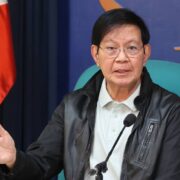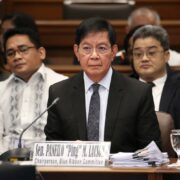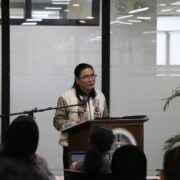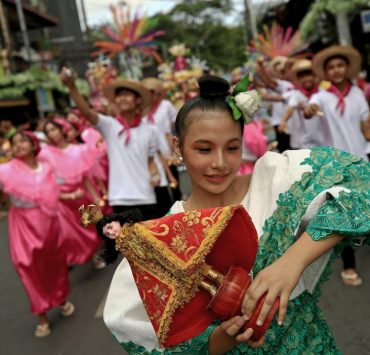Solidum: Include marketability, job prospects in new research, tech
BACOLOD CITY—The Negros Occidental provincial government is set to hold a power summit in February to ensure adequate and stable power supply on the island following the recent blackouts on Panay Island.Negros Occidental Gov. Eugenio Jose Lacson said the province is also pushing for the creation of more renewable power sources to energize Negros Island.
“The purpose is to ensure that we have enough power now and in the future. Learning from what happened in Panay, we would like to make sure that it will not happen here,” the governor said.
He said the province received a proposal for an offshore wind power farm to be located in the waters between Negros and Panay islands.
Panay Island is composed of the provinces of Iloilo, Capiz, Aklan and Antique, with the island-province of Guimaras and Negros Occidental completing the Western Visayas region. The other half of Negros Island is occupied by Negros Oriental, a province that belongs to the regional grouping of Central Visayas along with Cebu, Bohol and Siquijor.
Energy roadmap
The Negros Occidental provincial government is engaging experts from the University of St. La Salle in Bacolod City to come up with an energy roadmap.
Panay and Guimaras islands as well as parts of Negros experienced a three-day power outage that started on Jan. 2 due to the tripping of multiple power plants. The Energy Regulatory Commission has initiated an investigation on the power outage.
The National Grid Corporation of the Philippines earlier called for an industry-wide approach to resolve the persistent power supply issues in Western Visayas, as it maintained it should not be blamed for the outages since its mandate is not power generation but confined to transmission of power from producers to grid-connected areas.
Bacolod Mayor Alfredo Abelardo Benitez said power providers on Negros Island would be invited to the summit.
He said while Negros produces 700 megawatts (MW) of power and only consumes 440 MW, the power it produces goes through the grid for consumers in the Visayas grid.
According to Benitez, Negros needs to harness the power it produces locally for local consumption before it is exported to other areas.
“One of the reasons why we have this disturbance or outages is because sometimes the power supply still comes from other areas, and we rely heavily on the transmission lines,” Benitez said.
“Negros [needs] embedded power, and the summit will be held to find a win-win solution,” he added. INQ COTABATO CITY—A new political party in the Bangsamoro Autonomous Region in Muslim Mindanao (BARMM) has called out the Cebu Technological University (CTU) contingent in the Sinulog Festival for purveying a “historical inaccuracy” in its performance during the festival’s opening in Cebu City last Friday.
The CTU contingent was introduced as representing the BARMM, which is a collection of six provinces that has remained predominantly populated by Muslims after a long period of colonial conquests and waves of state-induced migration of Christians from Luzon and the Visayas.
The Bangsamoro Peoples Party (BPP), in a statement on Saturday, said while it appreciated the effort put into the dance performance by the CTU, “it is crucial to acknowledge a historical inaccuracy in the portrayal.”
The well applauded performance in veneration of Señor Santo Niño saw the CTU troupe garbed in outfit bearing mainly a golden color that is associated with most Moro tribes, and their designated Sinulog queen holding a miniature image of the Child Jesus.
But the group said the “dance appeared to portray an unclear narrative for those unfamiliar with history: that Muslim communities in this country were subject to Spanish colonial rule,” adding “it is important to stress that this historical account is inaccurate and does not align with the actual history of the region.”
Part of the basis for the Moro struggle for self-determination is their claim of having a history as a people distinct from that of the dominant Filipino nation, a narrative that has been suppressed for a long time. In a historic reversal, the government finally recognized Moro identity when it inked with the Moro Islamic Liberation Front in 2014 the landmark Comprehensive Agreement on the Bangsamoro, which became the basis for creating the BARMM.
Be ‘respectful of history’ “BARMM has a rich cultural and historical heritage, and we hold great respect for the histories of other regions in our diverse nation. However, it is essential to ensure that cultural representations are accurate and do not perpetuate historical inaccuracies,” BPP said.
“We believe that cultural events like the Sinulog Festival should be an opportunity to foster understanding and appreciation of our diverse cultures. We hope that moving forward, we can collaborate to ensure that cultural depictions are accurate and respectful of the histories they seek to represent,” the BPP added.
Lesson learned
On Saturday, the CTU issued a public apology, saying it “understands and deeply regrets elements of its performance which may have been perceived as insensitive or disrespectful toward the Moro culture and religion.”
“We assure you that there was absolutely no intention to cause harm or offense, and we are truly sorry if any aspect of our presentation came across as such. We value and respect the rich cultural and religious diversity of our community, including the significant contribution of the Muslim community to Cebu’s vibrant tapestry,” it added. INQCTU said inclusivity and understanding are core values of our university and hence it strives to celebrate all cultures with sensitivity and awareness, adding it was “committed to learning from the experience and taking steps to ensure that such incidents do not occur again.”
CTU said it would conduct an internal review of the performance to identify areas where they could improve their understanding and respect for diverse cultural and religious backgrounds.
“We understand that apologies alone cannot fully repair the hurt caused. However, we hope that our sincere remorse, commitment to learning, and proposed actions demonstrate our genuine desire to build bridges and foster understanding between our communities,” it said. INQ BAGUIO CITY—Future science and technology projects will need to be commercially viable so new ideas will “create wealth and improve the economy,” Science Secretary Renato Solidum said here on Thursday.
Solidum said all research to be funded by the government “need to have a market and livelihood perspective,” when he addressed the 2024 North Luzon Call Conference, which invited new research proposals from universities and scholars.
He cited policy set by President Marcos regarding a “critical need to foster a culture of innovation that works hand in glove with a culture of entrepreneurship.”
Solidum said new job opportunities will help encourage people to not only embrace innovations but also participate in making these changes, such as volunteering to maintain and protect community mangroves.
Interventions
He said the Department of Science and Technology (DOST) intends to help build “proactive, smart and innovative Filipinos,” create a “competitive and resilient economy,” help preserve the environment by creating “green jobs,” maintain food security and reduce power and transport costs. A key suggestion for this year’s body of research is to study commodities that trigger high inflation such as rice, yellow corn, livestock, dairy, poultry, aquaculture, transportation and fuel, the secretary said.
In the Cordillera, for instance, the phenomenon of vegetable oversupply requires science and technology intervention, Solidum said.
Once scientific studies and innovation “create impactful results in commodities” such as slowing down inflation, the average taxpayer would appreciate investments poured into technology, he said.
Since 2016, DOST has allocated P11.5 billion for research and technology grants, the secretary said, such as the Potato Research and Development Center at the Benguet State University in neighboring La Trinidad town which has been growing “clean (biologically disease-free)” potato seeds that have doubled farm production.
Last year, the government cofinanced PlastiCount Philippines, a multidisciplinary research project begun by Dr. Deo Florence Onda of the Marine Science Institute at the University of the Philippines Diliman and Mathematics Professor Paul Samuel Ignacio of University of the Philippines Baguio.
Onda, who showcased his project at the conference, said they have developed the only plastics tracking system and database for Southeast and East Asia.
Using artificial intelligence, their system is able to locate and tag microplastics found in land and water. “Ultimately, we aim toward attaining high productivity and a better quality of life for all,” Soldum stressed in his speech, “amid the challenges that confront us today in this volatile, uncertain, complex and ambiguous world.” —VINCENT CABREZA INQ CITY OF MALOLOS—Mayor Roderick Tiongson of San Miguel in Bulacan province has filed P17-million cyberlibel cases against a former councilor of his town and a local businesswoman over a series of alleged defamatory attacks posted against him on social media late last year.
Tiongson, in the complaint filed before the Bulacan Prosecutor’s Office on Thursday, named Melvin Santos, former town councilor and village chair of Barangay Camias, and Grace de Leon, a businesswoman from Barangay Sta. Rita Matanda, as respondents.
Tiongson, in his affidavit, a copy of which was obtained by Inquirer, said the social media live broadcasts and posts by Santos and De Leon accused him of alleged “molestation” and tagged him a “killer,’ “immoral like a dog” and a “corrupt” official, accusations that he said were “malicious lies and serious personal attacks” that did not only hurt and destroy his name and reputation but also that of his family.
No comment
The mayor sought for a P1-million compensation for each of the five counts of cyberlibel he filed against Santos and the same amount for each of the 12 counts of cyberlibel complaint he lodged against De Leon. De Leon, when contacted by the Inquirer on Friday, said in a phone message that she would not comment on the charges as she has yet to receive a copy of the complaints.
Santos, who was village chair of Barangay Camias from 2007 to 2018 and town councilor from 2019 to 2022, was contacted by Inquirer through Messenger on Thursday but said in a reply that he would just wait for the camp of Tiongson to prove the charges filed against him.
The mayor’s complaint said that Santos, in social media posts from Nov. 17 to Dec 2, 2023, had accused him of alleged involvement in illegal quarrying that had turned an area in Barangay Biak-na-Bato of the town into a “desert.”
De Leon, in posts in November last year, alleged that she saw the mayor make advances against a youth leader and of uttering allegedly offensive remarks about her personal life, the complaint noted.
De Leon also raised the supposed questionable acquisition of “numerous properties” by the mayor.
Tiongson denied all the accusations, saying they “were just meant to malign and destroy his name and reputation and even that of his family.”
“I believe in due process of law and with the charges I filed against them, they must prove as true all their unrelentless, ill and destructive accusations against me,” the mayor said. — CARMELA REYES-ESTROPE INQ

















